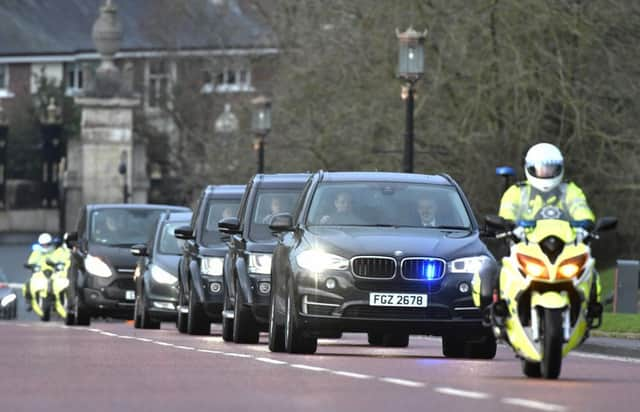Prime Minister Theresa May is in an impossible situation


After visits to Belfast, Dublin and Brussels the prime minister, Theresa May, must feel she has an impossible task in trying to change a withdrawal document the rest of the EU has made clear it does not want to change.
The ever brilliant Matt cartoon in the Daily Telegraph summed up her week well. He showed Brussels airport workers unveiling a runway banner saying NO, on grounds that this would save her landing to hear the same message. Despite doing her best against the odds she is in an impossible position. How, and if she gets around this, time will tell, but the UK farm unions made clear again that – in their words – it would be a disaster for agriculture to leave the EU with no deal in place. Logic is however having little sway in a debate that has become a battle for the survival of the government and Conservative party.
Advertisement
Advertisement
As tempers flare at Westminster interesting things emerge. One was a newspaper claim over the future of tariffs on imported food. Quoted in the Daily Mail the former Brexit minister, Dominic Raab, said that last
year the cabinet had agreed that with a no deal Brexit all tariffs on food imports would be scrapped. He claimed this would dampen down any inflationary impact of Brexit and give people a Brexit bonus in the shape of lower food prices. This was a light bulb moment, since it was proof that farmers are right to be sceptical about assurances that food standards will be maintained after Brexit.
It has been clear all along that scrapping tariffs would be a win, win for everyone, apart from farmers. It would, as Raab suggested, bring down prices for consumers by allowing in cheap food from outside the EU; it would give food processors and retailers access to cheaper raw materials and would be an incentive for countries to sign trade deals with the UK. The only group facing a lose, lose would be farmers, but with both major parties at Westminster now having an entirely urban focus that is not going to influence the argument. This could usher in a change of roles for farmers. They will become more custodians of the environment and less crucial as food producers. That is not what farmers signed up for when many voted for Brexit, but the logic taking us in that direction is hard to ignore.
The loss of influence of the farming lobby is a worry. It remains important in Scotland, Wales and here – but in our case we have no politicians at Stormont to influence. In England the farming lobby has
Advertisement
Advertisement
lost almost all its political influence over the years. This will be made all the worse as Brexit takes the UK away from the powerful European farming lobby organisation. They press the European Commission and farm ministers on an almost daily basis to take farmer-friendly decisions. The UK then had to implement the same policies, meaning farmers here gained from that European influence. After Brexit happens that will be no more and farmers will feel the impact. Instead decisions by Westminster will be influenced by the green lobby groups and be made by the Treasury.
It was no surprise this week when the Irish Farmers Association put out a statement welcoming assurances from the European Commission president, Jean Claude Juncker, and the farm commissioner, Phil Hogan, that the EU will compensate Irish farmers if they lose out because of Brexit. This was always on the cards. It will be a reward for losing out to protect the integrity of the single market and maintaining fortress Europe on imports. This cannot be a long term measure, but it reflects the willingness of Brussels to dig deep financially. That is easy when you represent 500 million citizens and 27 member states and it has always been on the cards. It is why the ‘they need us more than we need them’ argument is not realistic, as we are now seeing with warnings of the consequence of a no deal Brexit. Even vague assurances without money attached would be welcome, but that is unlikely. Even if it did farmers no longer believe assurances from politicians, who ignore their views on grounds that they know better how to deliver a secure future for agriculture.